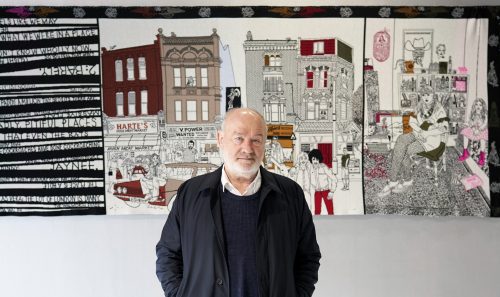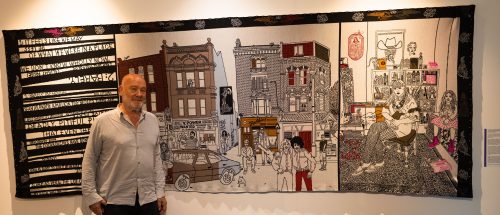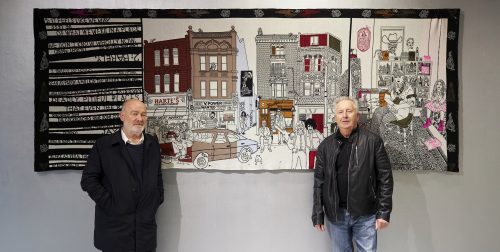
Tributes have been paid to well known music promoter Vince Power who has died at the age of 76.
Power ran some of London’s top music venues and has been credited with changing the face of live music in Britain.
Power came to London at the age of 15 with nothing, but sold his Mean Fiddler music empire for £38 million in 2005.
He first made his money with a second hand furniture business before opening the Mean Fiddler music venue in Harlesden.
After selling that business, Power set up Vince Power Music Group, which founded the Hop Farm festival and ran it between 2008 and 2012.
Born in Kilmacthomas, Co. Waterford, Vince moved to London in 1963.
By 1982 he had opened the Mean Fiddler in Harlesden, which became one of the most iconic music venues in the capital and welcomed legendary artists including Van Morrison, Johnny Cash and Paul McCartney.
Vince told us in 2022: “The Mean Fiddler opened on 9 December 1982, so it’s 40 years this year.
“Johnny Cash played there, Roy Orbison played there, everybody played there.
“Elvis Costello, Van Morrison, Christy Moore, The Chieftains.
“U2 never did that place for me but they played the Astoria for me.
“I remember one weekend I had The Rolling Stones one day and I had U2 the next day.”
At its height, his Mean Fiddler Music Group owned the most prolific live music venues in London including GAY, The Astoria and The Jazz Café.
It was credited with making Glastonbury a safe and viable festival as well as re-booting Reading and Leeds Festivals. Most recently he was overseeing the Camden Live music venue Dingwalls. He also had the Powers venue on Kilburn High Road.
His family announced the sad news at the weekend: “It is with great sadness that we confirm the passing of Vince Power. A visionary entrepreneur who enhanced and influenced the music industry significantly, whilst always being a dedicated, loving father and a loyal friend to so many.
“We want to thank everyone who has offered their condolences and request that our privacy be respected at this time of great sadness.”
Imelda May tweeted: “So sad to hear of the passing of the great Vince Power. I adored him. He took a chance on me at the start of my career when I needed it most. He was so important to Irish culture and community at home and the UK. He’ll be greatly missed. Love to his family.”
Singer songwriter Cerys Matthews wrote: “I’m going to miss you so very much, my friend in music, in thinking, in dreaming. Love you very much. Rip.”
Singer songwriter Tanita Tikaram tweeted: “So sad to hear Vince Power has passed away. Like many artists I owe so much to Vince, he gave me my first gig at the Mean Fiddler acoustic room attended by about 3 people but he made sure one of them was an important agent! My condolences to Vince’s family and loved ones.”
Promoter Aidan Shortall described him as a “maverick, a pioneer, a risk-taker and a man that still had his finger on the pulse”.
“Vince would always tell me of the Fleadh Mór in Tramore in 1993, where he brought Bob Dylan, Van Morrison, Ray Charles, The Pogues all to Tramore and he would always say, ‘I lost an awful lot of money that day, Aidan’,” Mr Shortall said.
DJ Roddie Cleere described him as a “music man to his core”, while singer-songwriter Niall McNamee said he was a “real gentleman” who left behind a considerable legacy in the music industry.
The Irish World went to Vince Power’s Kilburn office in2012 to interview him.
He said: “When I sold the Mean Fiddler, I thought that was going to be it but I was only retired for about a week.”

Power had promoted festivals in America, Ireland, the UK and Europe. He was behind the Sex Pistols’ reunion in 1996 and it was his 30th year in the industry.
Asked if it was still a challenge, he said: “It is actually, still a big challenge. We have a huge amount of competition. When I first did Reading festival in ’89, there were very few festivals, there was Reading, Glastonbury and one or two others, now there’s a festival every weekend. There’s not as many acts as you’d wish for out there. Some of the acts you want aren’t working. It’s a matter of juggling. It’s like putting together a patchwork quilt trying to put them all together and look good.
“I don’t like sitting backstage, I like to be around the front of the stage or out at the entrance greeting people as they come in. I like to go around the campsite to see if people are happy. I’m hands on because that’s the way I know. I need to be doing something to get rid of my nervous energy.
“I’ve done festivals for 25 years and you learn by being there. You’re trying to build a small town for the weekend and every time you walk away from it you say, ‘Why didn’t I think of that? I need to..’ There’s never a time when you couldn’t make it any better.”
Asked if he go into the same business if he was starting in modern times, he said: “I don’t know about this business but I would be doing something in the music business. All my family in Ireland all my children and grandchildren, they’re all musical. It’s in my blood although I can’t sing, not that you’d want to hear anyway. The way I get it out of my system is creating stuff for people and doing these big challenges. I would certainly be working for myself. I think I’m unemployable really. I couldn’t have a boss.”
Vince was honoured with a CBE in 2006.
On this he said: “It caused a bit of a ruckus when I got it. There was the question of, ‘Should an Irishman really be taking an award from Buckingham Palace?’ But I’ve lived here so many years now, all my children have been educated here. It would have been rude not to, really. That was a proud moment but I’m more proud of things that go on every day- like at the end of a festival when everyone’s happy. I don’t go around using the name, I just got it, put it away and got on with it.”
Vince also got an Irish World award in 2004: “You’re always very proud to be recognised by your own people.”
Although he moved his business to central London he returned to Kilburn.
Vince told us: “I came to Kilburn in 1963.
“I worked in Woolworths for about three months and then I came down here to Kilburn and more or less stayed.
“Kilburn has always been a place that has received immigrants.
“I’m still around here. All my business now is around Kilburn and Camden.
“I’ve always loved this particular area: Cricklewood, Kilburn, Camden area.”
The Irish World spoke to Vince again in 2022 when he was the subject of The Kilburn Tapestries, a piece of work by Electronic Sheep.
Vince Power told us at the launch at Brent Museum: “It’s nice to see a little bit of history.
“It gives a memory of what it was like and how Irish this area was.
“There was a lot of Irish in Kilburn.
“I’m back in Kilburn now.
“The Mean Fiddler left its stamp in Harlesden.
“I was just looking at Paul McCartney at Glastonbury a few days ago and I remembered we got him to play The Mean Fiddler.”
The tapestry also featured Irish icons Shane MacGowan, Rory Gallagher, Sinead O’Connor and Phil Lynott all hanging around The Mean Fiddler.
“Shane (MacGowan) played there regularly.

“Shane was important in the sense that that was the turning point.
“When I opened it, I wanted to turn it into a honky tonk, a spit and sawdust kind of place.
“That was sort of the romantic idea, but I lost a lot of money.
“We changed it, so Shane MacGowan and the Pogues were the first band to play there other than country bands.
“I remember the DJ was a country DJ and he resigned there and then.
“It was about nine o’clock in the evening when the Pogues came on.
“He went to introduce them, he said, ‘That’s it. I’m out of here’.
“He was disgusted, and everybody cheered.
“Phil used to come in with a friend regularly.
“He would go in and have a drink.
“Roy Orbison played there, Johnny Cash played there, everybody really, all the big bands played here, Chili Peppers played there, Eminem played there.
“It had great sound and we looked after the bands well so the place became very popular.
“Because I owned three houses at the back of the Fiddler, I had the garden so you had the garden for the dressing room.
“They loved sitting out there smoking and drinking and taking a little bit of drugs.
“People come up to me and say, ‘You know if it wasn’t for you, I wouldn’t have been here. My mum met my dad at the Fiddler.
“I always say, ‘You’re another Fiddler baby’.
“There’s lots of Fiddler babies.”
Vince Power is survived by his eight children including folk singer Brigid Mae Power.

